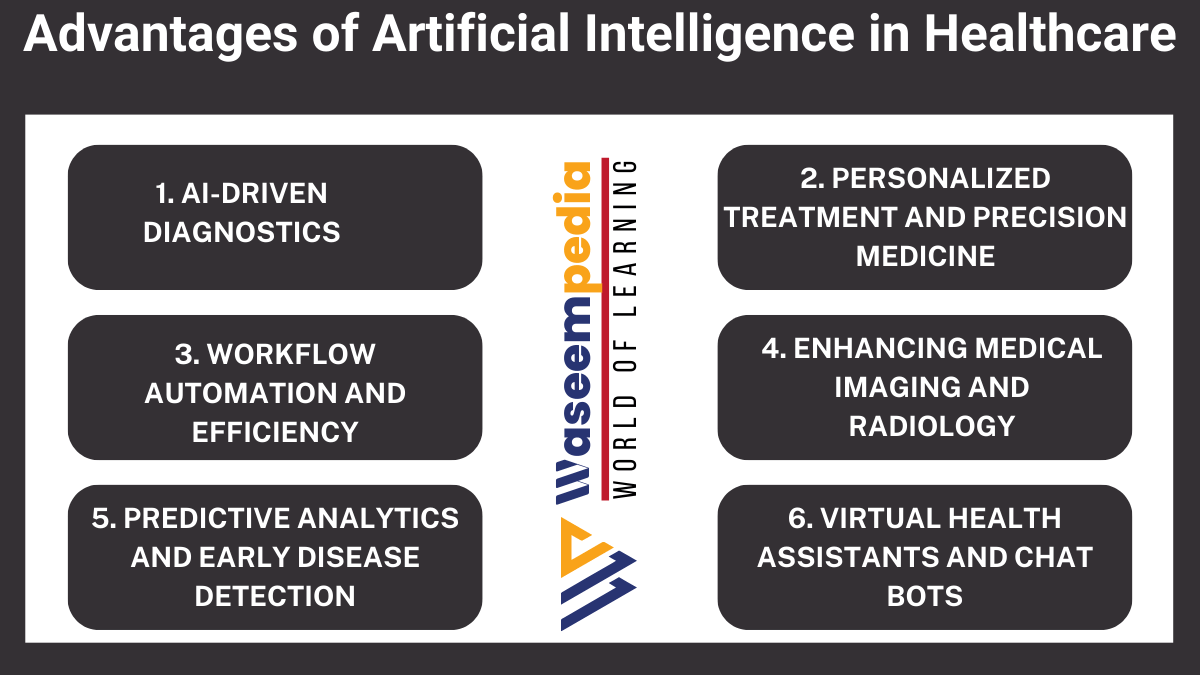AI is making a big difference in healthcare. It helps with diagnosing diseases, personalizing treatments, making healthcare work better, and advancing medical research. AI is changing the future of medicine and making healthcare more effective and patient-centered.
Artificial intelligence is revolutionizing the healthcare industry by offering numerous advantages that improve patient care, enhance diagnostics, optimize workflows, and advance medical research. From AI-driven diagnostics to personalized treatment and precision medicine, the potential applications of AI in healthcare are vast.
Artificial Intelligence (AI) has emerged as a groundbreaking technology with transformative potential in various industries. In the field of healthcare, AI is revolutionizing the way medical professionals diagnose, treat, and manage diseases.
By leveraging the power of machine learning, natural language processing, and data analytics, AI offers numerous advantages that enhance patient care, improve efficiency, and advance medical research. In this article, we will explore the significant advantages of artificial intelligence in healthcare and how it is reshaping the future of medicine.
In this digital era, the convergence of AI and healthcare is opening up a world of possibilities. AI algorithms can analyze vast amounts of medical data, identify patterns, and provide actionable insights to healthcare professionals. This technology holds immense potential in transforming healthcare delivery, improving patient outcomes, and optimizing resource allocation.
What is Artificial Intelligence in Healthcare?
Artificial Intelligence, or AI, is a special technology that helps doctors and medical professionals with their work. It can analyze a lot of medical information, understand patterns, and give useful insights. AI is changing the way we take care of our health.
8 Advantages of Artificial Intelligence in Healthcare
Let’s look at some of the ways AI is improving healthcare:
1. Accurate Diagnoses
AI helps doctors make more accurate and timely diagnoses. It can analyze medical images like X-rays and MRIs with great precision. By comparing these images to a big database, AI can find problems and diseases. This helps doctors make better decisions and start treatments earlier.
2. Personalized Treatment
AI helps personalize treatments for each patient. By looking at a person’s genetic information, medical history, and lifestyle, AI can suggest treatment options that work best for that person. This means treatments are more effective, with fewer side effects and better patient satisfaction.
3. Making Healthcare Smoother
AI makes healthcare work better and smoother. It can automate routine tasks like scheduling appointments and managing records. This frees up time for doctors and nurses to focus on patients. With AI, there’s less chance for mistakes and healthcare providers can give better care.
4. Improving Medical Imaging
AI is helping doctors with medical imaging, like X-rays and scans. AI algorithms can analyze these images and give helpful insights to radiologists. This makes it easier for doctors to find problems and make accurate diagnoses. It speeds up the process and leads to better patient outcomes.
5. Early Disease Detection
AI is great at predicting diseases early. By looking at patient data and medical records, AI algorithms can find patterns and risks for specific diseases. This helps doctors identify high-risk patients and take preventive measures. Early detection can save lives and prevent serious illnesses.
6. Virtual Health Assistants
Virtual health assistants powered by AI are becoming popular. They can talk to patients, give basic medical information, answer common questions, and provide support. Virtual health assistants make healthcare more accessible and engaging for patients.
7. Drug Discovery
AI is changing how we discover and develop new drugs. AI algorithms can analyze a lot of data to find potential new drugs and predict how well they will work. AI can also help with clinical trials by finding the right patients and monitoring their response to treatment. This speeds up the process of finding new therapies and helps patients get better care.
8. Ethical Considerations
While AI brings many benefits, we also need to think about ethical considerations. We need to protect patient privacy and make sure AI is used responsibly. It’s important to have rules and regulations to ensure that AI is used ethically and for the benefit of patients.

